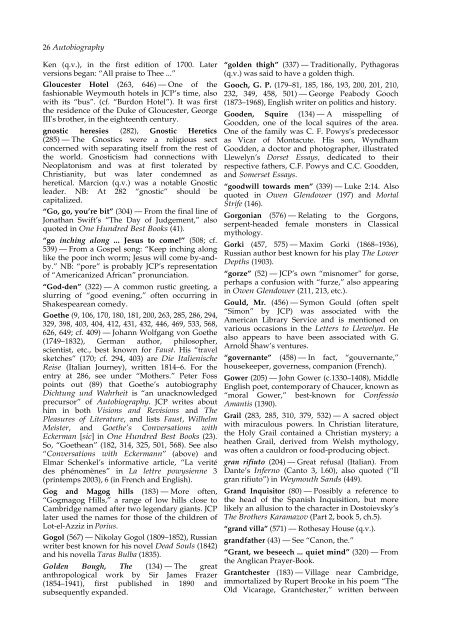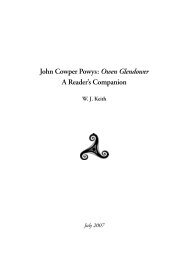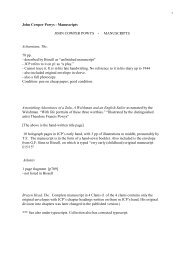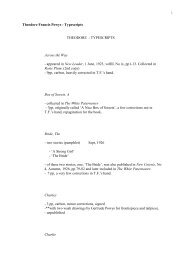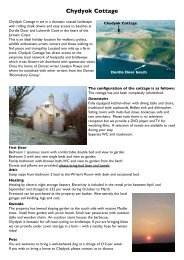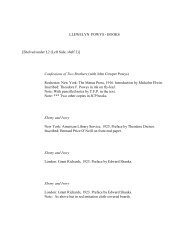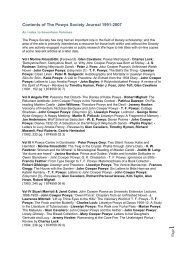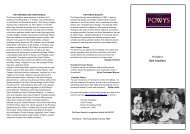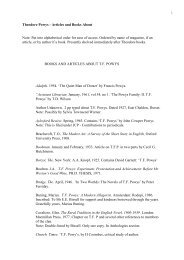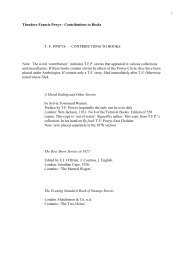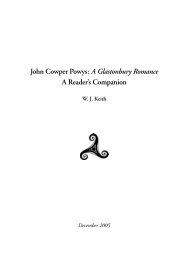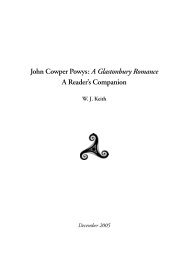J. C. Powys' Autobiography: A Reader's Companion - Site POWYS
J. C. Powys' Autobiography: A Reader's Companion - Site POWYS
J. C. Powys' Autobiography: A Reader's Companion - Site POWYS
Create successful ePaper yourself
Turn your PDF publications into a flip-book with our unique Google optimized e-Paper software.
26 <strong>Autobiography</strong><br />
Ken (q.v.), in the first edition of 1700. Later<br />
versions began: “All praise to Thee ...”<br />
Gloucester Hotel (263, 646) — One of the<br />
fashionable Weymouth hotels in JCP’s time, also<br />
with its “bus”. (cf. “Burdon Hotel”). It was first<br />
the residence of the Duke of Gloucester, George<br />
III's brother, in the eighteenth century.<br />
gnostic heresies (282), Gnostic Heretics<br />
(285) — The Gnostics were a religious sect<br />
concerned with separating itself from the rest of<br />
the world. Gnosticism had connections with<br />
Neoplatonism and was at first tolerated by<br />
Christianity, but was later condemned as<br />
heretical. Marcion (q.v.) was a notable Gnostic<br />
leader. NB: At 282 “gnostic” should be<br />
capitalized.<br />
“Go, go, you’re bit” (304) — From the final line of<br />
Jonathan Swift’s “The Day of Judgement,” also<br />
quoted in One Hundred Best Books (41).<br />
“go inching along ... Jesus to come!” (508; cf.<br />
539) — From a Gospel song: “Keep inching along<br />
like the poor inch worm; Jesus will come by-andby.”<br />
NB: “pore” is probably JCP’s representation<br />
of “Americanized African” pronunciation.<br />
“God-den” (322) — A common rustic greeting, a<br />
slurring of “good evening,” often occurring in<br />
Shakespearean comedy.<br />
Goethe (9, 106, 170, 180, 181, 200, 263, 285, 286, 294,<br />
329, 398, 403, 404, 412, 431, 432, 446, 469, 533, 568,<br />
626, 649; cf. 409) — Johann Wolfgang von Goethe<br />
(1749–1832), German author, philosopher,<br />
scientist, etc., best known for Faust. His “travel<br />
sketches” (170; cf. 294, 403) are Die Italienische<br />
Reise (Italian Journey), written 1814–6. For the<br />
entry at 286, see under “Mothers.” Peter Foss<br />
points out (89) that Goethe’s autobiography<br />
Dichtung und Wahrheit is “an unacknowledged<br />
precursor” of <strong>Autobiography</strong>. JCP writes about<br />
him in both Visions and Revisions and The<br />
Pleasures of Literature, and lists Faust, Wilhelm<br />
Meister, and Goethe’s Conversations with<br />
Eckerman [sic] in One Hundred Best Books (23).<br />
So, “Goethean” (182, 314, 325, 501, 568). See also<br />
“Conversations with Eckermann” (above) and<br />
Elmar Schenkel’s informative article, “La verité<br />
des phénomènes” in La lettre powysienne 3<br />
(printemps 2003), 6 (in French and English).<br />
Gog and Magog hills (183) — More often,<br />
“Gogmagog Hills,” a range of low hills close to<br />
Cambridge named after two legendary giants. JCP<br />
later used the names for those of the children of<br />
Lot-el-Azziz in Porius.<br />
Gogol (567) — Nikolay Gogol (1809–1852), Russian<br />
writer best known for his novel Dead Souls (1842)<br />
and his novella Taras Bulba (1835).<br />
Golden Bough, The (134) — The great<br />
anthropological work by Sir James Frazer<br />
(1854–1941), first published in 1890 and<br />
subsequently expanded.<br />
“golden thigh” (337) — Traditionally, Pythagoras<br />
(q.v.) was said to have a golden thigh.<br />
Gooch, G. P. (179–81, 185, 186, 193, 200, 201, 210,<br />
232, 349, 458, 501) — George Peabody Gooch<br />
(1873–1968), English writer on politics and history.<br />
Gooden, Squire (134) — A misspelling of<br />
Goodden, one of the local squires of the area.<br />
One of the family was C. F. Powys’s predecessor<br />
as Vicar of Montacute. His son, Wyndham<br />
Goodden, a doctor and photographer, illustrated<br />
Llewelyn’s Dorset Essays, dedicated to their<br />
respective fathers, C.F. Powys and C.C. Goodden,<br />
and Somerset Essays.<br />
“goodwill towards men” (339) — Luke 2:14. Also<br />
quoted in Owen Glendower (197) and Mortal<br />
Strife (146).<br />
Gorgonian (576) — Relating to the Gorgons,<br />
serpent-headed female monsters in Classical<br />
mythology.<br />
Gorki (457, 575) — Maxim Gorki (1868–1936),<br />
Russian author best known for his play The Lower<br />
Depths (1903).<br />
“gorze” (52) — JCP’s own “misnomer” for gorse,<br />
perhaps a confusion with “furze,” also appearing<br />
in Owen Glendower (211, 213, etc.).<br />
Gould, Mr. (456) — Symon Gould (often spelt<br />
“Simon” by JCP) was associated with the<br />
American Library Service and is mentioned on<br />
various occasions in the Letters to Llewelyn. He<br />
also appears to have been associated with G.<br />
Arnold Shaw’s ventures.<br />
“governante” (458) — In fact, “gouvernante,”<br />
housekeeper, governess, companion (French).<br />
Gower (205) — John Gower (c.1330–1408), Middle<br />
English poet, contemporary of Chaucer, known as<br />
“moral Gower,” best-known for Confessio<br />
Amantis (1390).<br />
Grail (283, 285, 310, 379, 532) — A sacred object<br />
with miraculous powers. In Christian literature,<br />
the Holy Grail contained a Christian mystery; a<br />
heathen Grail, derived from Welsh mythology,<br />
was often a cauldron or food-producing object.<br />
gran rifiuto (204) — Great refusal (Italian). From<br />
Dante’s Inferno (Canto 3, l.60), also quoted (“Il<br />
gran rifiuto”) in Weymouth Sands (449).<br />
Grand Inquisitor (80) — Possibly a reference to<br />
the head of the Spanish Inquisition, but more<br />
likely an allusion to the character in Dostoievsky’s<br />
The Brothers Karamazov (Part 2, book 5, ch.5).<br />
“grand villa” (571) — Rothesay House (q.v.).<br />
grandfather (43) — See “Canon, the.”<br />
“Grant, we beseech ... quiet mind” (320) — From<br />
the Anglican Prayer-Book.<br />
Grantchester (183) — Village near Cambridge,<br />
immortalized by Rupert Brooke in his poem “The<br />
Old Vicarage, Grantchester,” written between


